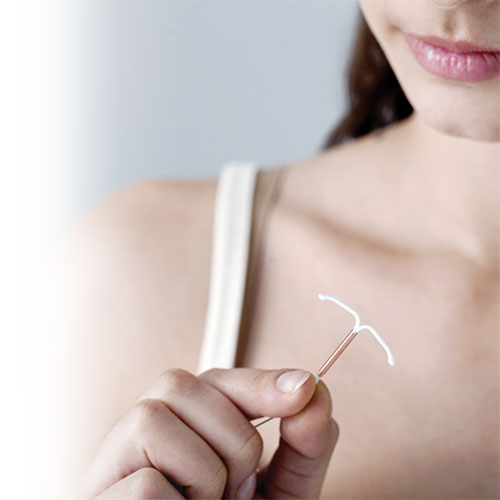The intrauterine device (IUD) is an interesting contraception option. However, there are several misconceptions being conveyed about it.
The intrauterine device (IUD): what is it?
There are two types of IUDs on the market—the hormonal IUD and copper IUD.
The hormonal IUD is a contraceptive device that releases a progestogenic hormone called levonorgestrel. The T-shaped IUD is made of soft plastic and measures about three centimetres. A reservoir containing the hormone is found inside the vertical stem. There are two strings attached to the lower end of the device to facilitate its removal or to check if it is properly positioned. Its effectiveness largely relies on the hormone it releases, which explains why it is referred to as a hormonal method.
The copper IUD looks similar to the hormonal IUD, except that it does not contain an active substance (no hormone). It is also made of plastic, but its core is wrapped in copper wire, which is where it gets its name. In Canada, there are various models available, including shorter ones (for women who have a small uterus) or standard length.
Myths or reality?
Here is some of the information circulating about IUDs. Is the information a myth or reality?
1
An IUD is not a good contraceptive option for a woman who has never given birth.
Answer: false. Some mistakenly believe that IUD insertion should not be considered in women who have never given birth, while in fact, this option offers a number of advantages for women. Its effectiveness in preventing pregnancy, low exit rate after one year (compared to oral contraceptives), and safety profile even make it an interesting option for adolescents.
2
The IUD can cause pelvic infections.
Answer: true, but this is a rare occurrence. Although the risk of a pelvic infection slightly increases during the three or four weeks following insertion of an intrauterine device, this type of infection is quite rare in the absence of a cervical infection at the time the device is inserted. Additionally, after one month, this risk returns to normal. Note that, the hormonal IUD even prevents some infections to a small degree.
3
The IUD that releases levonorgestrel can cause acne.
Answer: true. The risk of acne is slightly increased in hormonal IUD users. Acne is among the most common side effects; observed in more than 10% of cases. However, note that this adverse effect does not always occur! Proper skin care can help lower the risk of acne.
4
The IUD protects against sexually transmitted and blood-borne infections (STBIs).
Answer: false. Unfortunately, the use of an IUD sometimes gives certain people a false sense of security to the point where they fail to protect themselves against STBIs. The IUD does not protect against STBIs in any way, including HIV. That is why it is important to use an additional contraception method that provides protection against STBIs (in other words, a condom) during any sexual activity that is considered to be at risk.
5
An IUD is most suitable for women who have a stable partner.
Answer: true and false. Because the IUD does not protect against STBIs and it is associated to a higher risk of medical complications if an STBI is contracted during the use of an IUD, this method may seem more appropriate for people who adopt safe sexual practices. It is important to highlight that monogamy is not the only way to promote safe sexual practices—systematic use of a condom is also an appropriate method. Individuals who have multiple sexual partners should consider the condom as a contraceptive method and/or as a protective measure against STBIs.
6
IUD insertion is very painful.
Answer: false. Most women find the discomfort or minor pain associated with IUD insertion to be mild. Occasionally, the pain felt afterwards may be a little more intense or resemble menstrual cramps, but they usually disappear after a few days. If you have concerns about this, talk about it to your doctor, who will be able to reassure, inform offer you advice on how to minimize pain, such as taking an analgesic.
7
The use of an IUD makes intercourse more difficult or unpleasant.
Answer: false. Many people have the impression that an IUD will have a negative impact on intercourse when this is usually not the case. Chances are that you and your partner will not notice anything in particular if you use an IUD. However, it is possible that you feel the strings, in which case, they can be cut shorter. Speak to your doctor if you feel pain or discomfort during intercourse.
8
If I use an IUD, my period will stop over time.
Answer: true, but not always. Over time, it is true that the use of a hormonal IUD can cause your period to stop. Although this can have undeniable advantages, some women can see it as an inconvenience, such as mistakenly suspecting pregnancy or the onset of menopause. Interruption of the menstrual cycle does not occur in all women. Some women will see their period decreased in terms of intensity and duration.
In sum, the intrauterine device is an interesting option due to its simplicity. It eliminates the constraint of having to take a pill every day or having to replace a patch or vaginal ring. When using an IUD, there is no need to stress about forgetting to take a pill. However, as with any health-related decision, it is important to be well-informed in order to make the best choice.
Do not hesitate to speak to your pharmacist about any contraception-related issues.

